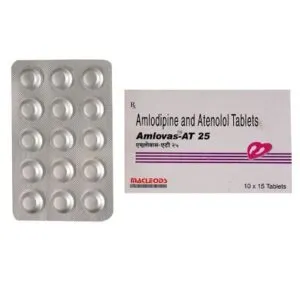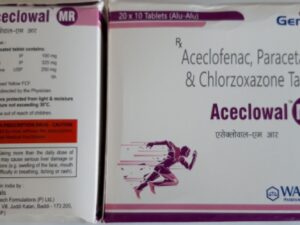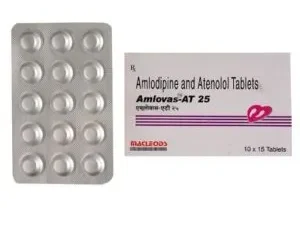Amlovas-AT Tablet is a prescription medication used for the treatment of high blood pressure (hypertension) and chest pain related to the heart (angina). It is a combination of two active ingredients—Amlodipine, a calcium channel blocker, and Atenolol, a beta-blocker. This dual-action formula is prescribed when a single medicine is not enough to control blood pressure. Amlovas-AT helps lower blood pressure, ease the heart’s workload, and improve blood flow. This not only controls symptoms but also reduces the risk of heart attacks, strokes, and other cardiovascular complications over the long term.
 Uses
Uses
- Treatment of Hypertension (high blood pressure)
- Treatment of Angina (heart-related chest pain)
Benefits of Amlovas AT
- Lowers blood pressure effectively by targeting different pathways in the cardiovascular system
- Reduces the frequency and severity of angina (chest pain)
- Improves oxygen flow to the heart and supports cardiac efficiency
- Lowers the risk of heart-related complications like stroke and heart failure
- Enhances exercise tolerance and overall quality of life in heart patients
 How Amlovas-AT Tablet works
How Amlovas-AT Tablet works
Amlovas-AT Tablet combines the action of two drugs. Amlodipine works by relaxing and widening the blood vessels. This allows blood to flow more easily and reduces the pressure on the walls of arteries. Atenolol works by slowing down the heart rate and reducing the force of each heartbeat. This decreases the heart’s demand for oxygen and reduces blood pressure. The combined effect of both medicines ensures more efficient blood flow and reduces the strain on the heart. As a result, it not only treats high blood pressure but also helps prevent angina attacks. The medicine also reduces the workload on the heart, which is essential in people with heart-related conditions. It should be taken once daily, preferably on an empty stomach, at the same time every day. Skipping doses or stopping the medication suddenly may cause a spike in blood pressure or worsen chest pain.
 Side effects
Side effects
- Headache
- Slow heart rate
- Nausea
- Swelling (edema)
- Tiredness or fatigue






